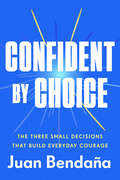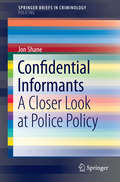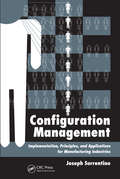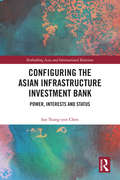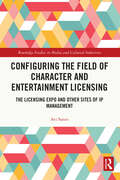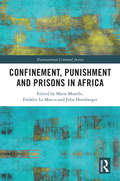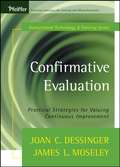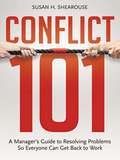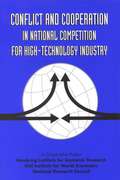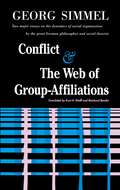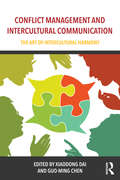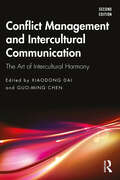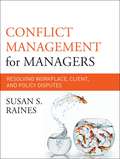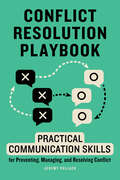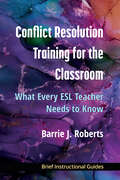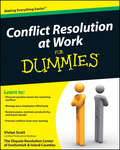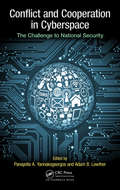- Table View
- List View
Confident by Choice: The Three Small Decisions That Build Everyday Courage
by Juan BendañaBuild unshakable confidence, break through fear, and live an inspired life with a practical, research-backed framework that transforms small steps into big changes!&“This book flips the script on confidence. Confident by Choice is a call to stop waiting and start showing up, even when you&’re not ready.&”—Ben Nemtin, #1New York Times bestselling author of What Do You Want to Do Before You Die?What if you could summon genuine confidence anytime you need it?Being happier, building better relationships, overcoming fear: the missing link between you and everything you want to achieve is self-confidence. The problem? Confidence is hard to build, and even when we do, it often feels temporary and forced.After years of research and working with over 250,000 individuals, Juan Bendaña uncovered the four myths about confidence that actually cause and reinforce self-doubt. Confidence is not linked to genetics, extraversion, insecurities, or competence.To combat these myths, Juan Bendaña developed the Confidence Cycle, a repeatable flywheel that will help you gain and sustain confidence in every aspect of life through three key decisions:Decision #1:• Micro-Energy: Direct excitement toward the area of improvement.Decision #2:• Micro-Courage: Find the bravery to move through discomfort.Decision #3:• Micro-Action: Complete a small action.RESULT: Micro-Proof & Boost of Confidence: Receive evidence that you are headed in the right direction, which gives you more confidence, thus continuing the cycle.This actionable and hands-on guide will jumpstart your confidence and help you build lasting courage to be your best self and face life&’s inevitable challenges.
Confidential Informants: A Closer Look at Police Policy (SpringerBriefs in Criminology)
by Jon ShaneWhile confidential informants (CI's) can play a crucial role in police investigations, they also have the potential to cause great harm if they are dishonest. The process by which police agencies qualify a CI to work and the strength of agency policy may be the source of the problem. This Brief examines the integrity problem involving CIs in police operations within the United States, provides an overview of pitfalls and problems related to veracity and informant integrity including the difficulties in detecting when a CI is lying, and compares the provisions of actual published police policy to the model CI policy published by the International Association of Chiefs of Police (IACP). The analysis shows a wide divergence between actual police policy and the national standard promulgated by the IACP. The Brief provides policy recommendations for improving use of CIs that can potentially reduce or eliminate integrity problems that can lead to organizational accidents such as wrongful arrests and convictions, injuries or deaths. Some Courts have issued measures to ensure that information received from CIs is reliable by examining sworn testimony and documents related to their work. However, as this Brief explores, this judicial effort arises only after a police operation has taken place, and the use of force - even deadly force--has already been employed. The author proposes integrity testing beforehand, which would allow police to have a greater understanding of a CI's motivation, ability and veracity when conducting law enforcement operations. In addition, there are aspects of police policy that can enhance CI management such as training, supervision and entrapment that can further guard against integrity problems. Although integrity testing is not flawless, it does interpose an additional step in the CI management process that can help guard against wrongful conviction and perjury that harms the judicial process.
Confidently Chill: An Anxiety Workbook for New Adults
by Nadir Balan Yener Balan Duygu BalanConfidently Chill is a groundbreaking two-book set comprising an evidence-based medical workbook and a captivating graphic novel.Delving into anxiety's societal, familial, and individual dimensions, this unique resource offers practical strategies rooted in empirical research, clinical methodologies, and psychological theory.Seamlessly blending medical expertise with award-winning artistry, Confidently Chill promises a holistic journey towards identity formation and lasting healing amidst today's unprecedented challenges.
Configuration Management: Implementation, Principles, and Applications for Manufacturing Industries
by Joseph SorrentinoBest Practices in Configuration Management to Ensure QualityMany organizations are invoking a new kind of management technique - Configuration Management - meant to ensure a product maintains its originally intended design, materials, composition, and processing throughout its entire lifecycle. This method moves away from current supply chain think
Configuring the Asian Infrastructure Investment Bank: Power, Interests and Status (Rethinking Asia and International Relations)
by Ian Tsung-Yen ChenStudying the Asian Infrastructure Investment Bank (AIIB) through the lens of international relations (IR) theory, Chen argues that it is inappropriate to treat the AIIB as either a revisionist or a complementary institution. Instead, the bank is still evolving and the interaction of power, interests, and status that will determine whether the bank will go wild. Theoretically, the current shape of the AIIB will influence global strategic conditions and global perceptions of the bank itself, consequently affecting China’s level of dissatisfaction with its power and status in the international financial system and maneuvering in the AIIB. To empirically show that, this book presents the evolution of the AIIB, compares the bank with its main competitors in the Asia-Pacific region, and conducts ten comparative case studies to show how countries around the world have positioned themselves in response to the emergence of the AIIB. This book presents critical insights for scholars and foreign-policy practitioners to understand China’s surging influence in international organizations and how China can shape the world order. It should prove of interest to students and scholars of IR, strategic studies, China Studies, Asian Studies, developmental studies, economics, and global finance.
Configuring the Field of Character and Entertainment Licensing: The Licensing Expo and Other Sites of IP Management (Routledge Studies in Media and Cultural Industries)
by Avi SantoThis book examines the creative impact of licensing on the entertainment industry, how licensing practitioners’ occupational disposition is formed, and the role licensing professionals play in managing the circulation of intellectual property. Offering a study of the spatial logics and fantasies employed by the licensing field via its annual trade show, the Licensing Expo, this volume investigates how space and place are instrumental in both fortifying and exposing the political-economic, infrastructural, as well as ideological structures that constrain and enable participation in the licensing field. Further supplemented by participant observation and interviews with 25 industry professionals, the book explores how the licensing field understands its increasingly central role in the entertainment industry’s operations, and how it responds to changes in retail environments, digital platforms, and international markets, phenomena which have required a recalibration of the field’s occupational identity. An exploration of an understudied aspect of the entertainment industry, this book will primarily appeal to scholars within media studies, and those studying media industries, media franchises, and media work cultures. It will also be of interest to people studying consumer culture, brand culture, advertising, organizational communication, as well as fan cultures.
Confinement, Punishment and Prisons in Africa (Transnational Criminal Justice)
by Marie Morelle, Frédéric Le Marcis and Julia HornbergerThis interdisciplinary volume presents a nuanced critique of the prison experience in diverse detention facilities across Africa. The book stresses the contingent, porous nature of African prisons, across both time and space. It draws on original long-term ethnographic research undertaken in both Francophone and Anglophone settings, which are grouped in four parts. The first part examines how the prison has imprinted itself on wider political and social imaginaries and, in turn, how structures of imprisonment carry the imprint of political action of various times. The second part stresses how particular forms of ordering emerge in African prisons. It is held that while these often involve coercion and neglect, they are better understood as the product of on-going negotiations and the search for meaning and value on the part of a multitude of actors. The third part is concerned with how prison life percolates beyond its physical perimeters into its urban and rural surroundings, and vice versa. It deals with the popular and contested nature of what prisons are about and what they do, especially in regard to bringing about moral subjects. The fourth and final part of the book examines how efforts of reforming and resisting the prison take shape at the intersection of globally circulating models of good governance and levels of self-organisation by prisoners. The book will be an essential reference for students, academics and policy-makers in Law, Criminology, Sociology and Politics.
Confirmative Evaluation
by James L. Moseley Joan C. DessingerThis much-needed book offers trainers, consultants, evaluation professionals, and human resource executives and practitioners a hands-on resource for understanding and applying the proven principles of confirmative evaluation. Confirmative evaluation is a marriage of evaluation and continuous improvement. Unlike other types of evaluation--which are used during the design of a learning program or applied immediately after conducting a program--confirmative evaluation follows several months after the program is implemented. It tests the endurance of outcomes, the return on investment, and establishes the effectivenss, efficiency, impact, and value of the training over time.
Conflict 101: A Manager's Guide to Resolving Problems So Everyone Can Get Back to Work
by Susan H. SHEAROUSELearn how conflict is created, how to respond to it, and how to manage it more effectively so that your team can get back to doing what it does best: producing top results for your organization.From mild disagreements to major personnel blowouts, conflict in the workplace is unavoidable. Conflict 101 employs research, humor, and relatable anecdotes to help readers more deeply understand: what it takes to build trust,harness negative emotions,encourage apologies and forgiveness,use a solution-seeking approach,and say what needs to be said in the workplace to move past conflicts.Whether it&’s a fight over resources, a disagreement about how to get things done, or an argument stemming from perceived differences in identities or values, the manager&’s role is to navigate relationships, build compromises, and encourage better collaboration.In doing so, you&’ll not only become a stronger manager--you&’ll build a much stronger team.
Conflict And Cooperation In National Competition For High-technology Industry
by National Research Council NRCThis unique volume contains a powerful set of recommendations on issues at the center of international discussions on investment, trade, and technology policy. They take into account the globalization of industrial activity and the special characteristics of high-technology industries while recognizing the continued policy role of national governments.The book identifies the rationale for promotional measures for high-technology industries, delineates sources of friction among the leading industrial countries, and proposes policies to enhance international cooperation and strengthen the multilateral trading regime.This volume also examines the factors driving collaboration among otherwise competing firms and national programs, highlights the need to develop principles of equitable public and private international cooperation, and emphasizes the linkage between investment, government procurement, and other trade policies and prospects for enhanced international cooperation.
Conflict And The Web Of Group Affiliations
by George SimmelEssays by the 19th century sociologist and philosopher.
Conflict Coaching Fundamentals: Working With Conflict Stories
by Samantha HardyWe naturally create stories to help us making meaning of our world, but in conflict situations the kinds of stories we typically tell ourselves can actually make it harder for us to manage and resolve the conflict constructively. This book provides an accessible framework for understanding why people tell their conflict stories the way they do, and how to help them move away from conflict stories that prevent them from understanding and responding to conflict in an effective way. Presented using highly engaging and accessible cases, the book is designed to help people working with others in conflict to fully support them by understanding which areas of the conflict story to focus their attention on, and using practical techniques to support people to rewrite their story into a more constructive one to better manage the situation. The book also provides practical strategies to help people who are themselves in a conflict scenario to rewrite and enact a version of their conflict story that helps them to more constructively manage, and often resolve, their situation. A conflict management coaching system is introduced that is designed to address the particular problems created by dysfunctional conflict stories. This is a book specifically for those who work with people in conflict (mediators, conflict coaches, managers, lawyers, HR staff, teachers) and also for anyone who wishes to better understand their own experience of conflict.
Conflict Management
by Baden EunsonConflict Management is an easy-to-read and high-powered tool for understanding and managing conflict situations. Conflict can spiral out of control, but if you understand how the spiral works you may be able to prevent it from even beginning.In this book you will find many options for managing conflict, including:planninggoal settingcompromisemediationExpert communicator Baden Eunson also takes an in-depth look at negotiation skills. He offers a visual and fresh approach to the work of strategies and tactics, negotiation styles, the importance of listening and questioning skills, the reasons why the location of negotiation can affect its outcome, and why the phrase 'win-win' is not a cliché but a technique for success.
Conflict Management and Intercultural Communication: The Art of Intercultural Harmony
by Guo-Ming Chen Xiaodong DaiIn the globally interconnected world, conflicts often arise as a result of tensions between different cultural perceptions and diverse social preferences. Effectively managing conflicts and harmonizing intercultural relationships are essential tasks of intercultural communication research. This book seeks to find effective intercultural conflict management solutions by bringing together a group of leading international scholars from different disciplines to tackle the problem. Consisting of two parts, this book covers major theoretical perspectives of conflict management and harmony development in the first and conflict management and harmony development in different cultural contexts in the second. Integrating the latest work on conflict management and intercultural harmony, Conflict Management and Intercultural Communication takes an interdisciplinary approach, adopts diverse perspectives, and provides for a wide range of discussions. It will serve as a useful resource for teachers, researchers, students and professionals alike.
Conflict Management and Intercultural Communication: The Art of Intercultural Harmony
by Guo-Ming Chen Xiaodong DaiConflict management and harmony building are two key issues of intercultural communication research and merit particular attention in the globally interconnected world. In the expanded second edition, the book explores the effective ways to manage intercultural conflict and develop intercultural harmony, and takes an interdisciplinary approach to address the two issues. The book begins with the theoretical perspectives on conflict management and harmony building. It examines intercultural communication ethics, diversity and inclusion, conflict resolution, conflict face negotiation, and intercultural competence. It presents both Western and non-Western perspectives. The book then addresses in its second section conflict management and harmony building in specific contexts. These include communication in intergenerational relationships, multinational corporations, and virtual spaces, and covers a range of national cultures including the USA, Japan, Germany, and China. Drawing on the current research findings, this book covers the major theoretical perspectives and provides for a wide range of discussions on intercultural conflict management. It is a crucial reference for teachers, students, researchers, and practitioners alike.
Conflict Management for Managers
by Susan S. Raines"Raines masterfully blends the latest empirical research on workplace conflict with practical knowledge, skills, and tools to effectively manage and prevent a wide range of conflict episodes. This is a highly applicable 'top shelf book' that will assist anyone from the aspiring manager to top level management and leadership in the public, private, and nonprofit sectors. It will also be a fast favorite of professors, trainers, and students of business and conflict management."- Brian Polkinghorn, Distinguished Professor, Center for Conflict Resolution, Salisbury University. "With her broad dispute resolution, teaching, and editing experience, Susan Raines is uniquely qualified to organize what is known about conflict management in the workplace. She has succeeded in providing private, public, and nonprofit managers with accessible concepts and tools to deal effectively with the internal and external conflicts they must confront every day. Essential reading for all managers!"- Alan E. Gross, senior director, training coordinator, New York Peace Institute"After reading an advance copy of Raine's impressive book, I can't wait to begin to use it as a seminal text in my classes in organizational conflict. I am amazed at her ability to cover so well such disparate subjects as systems design, public policy disputes, small and large group processes, customer conflicts, conflicts in a unionized environment, and conflicts within regulatory contexts. Her user-friendly writing style is enhanced by her salient examples of exemplary and mistake-laden practices within public and private sector organizations. A 'must-read' for scholars, students, and practitioners interested in organizational conflict."- Neil H. Katz, professor, Conflict Analysis and Resolution, Nova-Southeastern University"Conflict management skills are essential to a manager's success. Raines, a leading scholar and practitioner, provides a comprehensive and strategic new guide to these critical skills and how to use them in any organization."- Lisa Blomgren Bingham, Keller-Runden Professor of Public Service, School of Public and Environmental Affairs, Indiana University
Conflict Resilience: Negotiating Disagreement Without Giving Up or Giving In
by Robert Bordone Joel Salinas M.D.AN INSTANT USA TODAY BESTSELLERConflict management expert Robert C. Bordone and leading behavioral neurologist Joel Salinas, M.D., join forces to introduce conflict resilience: the radical science of standing strong in the face of conflict and breaking the bad habits that sabotage our politics, workplaces, and most important relationships.Conflict is getting the better of us.From our homes and community centers to C-Suites and Congress, disagreements are happening everywhere, with increasing frequency, and are being treated like winner-takes-all debates rather than as opportunities for conversation and positive change. This puts a tremendous and untenable strain on our most important relationships and institutions.Unable or unwilling to handle conflict with skill, we ignore it or avoid it for as long as possible; when we are forced to face it, everyday disagreements and temporary flare-ups rapidly escalate to a fever pitch. Neither approach addresses underlying issues, promotes stronger relationships, or yields satisfying results.But there is a solution: a combined skill- and mindset that Bordone calls conflict resilience: the ability to not only sit with and grow from disagreement, but to find new ways to communicate with authority and confidence without others feeling left unheard. In this powerful, hopeful book, Bordone, an internationally-recognized negotiator, former professor, and Senior Fellow at Harvard Law School, and Joel Salinas, M.D., a cutting-edge scientist from Harvard Medical School, combine the inner mechanics of conflict—literally what’s going on in our bodies and our brains during moments of distress—to produce a groundbreaking guide for how to navigate it, including:How to get out of your own way as a communicatorUnderstanding the importance of timingHow to embrace disagreement as an advantageLearning how to anticipate and manage defensivenessAnd more!Conflict Resilience provides scientifically proven tools to help you drive agreement when possible, and empower you, when agreement is impossible, to strengthen your ability to speak in conflict and withstand the stress of doing so.In these polarized times, when consensus, agreement, and problem-solving often feel elusive or even downright pointless, conflict resilience becomes the key to move forward. This book serves as a guidebook to bring people together, and an invitation to radically transform how we interact with our friends and families, our coworkers, our students, and our neighbors.
Conflict Resolution Playbook: Practical Communication Skills for Preventing, Managing, and Resolving Conflict
by Jeremy PollackPractical strategies to manage conflict in both personal and professional relationships Conflict is an unavoidable aspect of human existence, so it's vital to develop communication skills that will help you navigate these challenging moments. With The Conflict Resolution Playbook, you'll discover real-life solutions to everyday problems and develop communication skills that can help you make breakthroughs at work, improve your relationships at home, and lead to significant personal growth. You'll start by learning about conflict and the fundamental communication skills necessary for resolution. Then you can put that knowledge to use with clear-cut strategies for preventing conflicts, resolving them once they start, and dealing with common issues, such as gaslighting and bullying. Along the way, you'll gain a better understanding of conflict itself—where it comes from, why it cuts so deep, and how it can be of value. Improve your communication skills with: Back to the basics—Identify humankind's core psychological needs—identity, safety, care, autonomy, growth, and stimulation—and how they relate to conflict. Real-world advice—Learn to recognize different communication styles, collaborate on solutions, practice assertiveness, and more, through relatable scenarios and actionable strategies. The written word—Discover tips for avoiding or resolving common digital communication issues and boost your text-based communication skills. Learn how to improve your communication skills and develop the tools you need to navigate your way through any conflict.
Conflict Resolution Training for the Classroom: What Every ESL Teacher Needs to Know
by Barrie RobertsESL instructors without a background in conflict resolution (CR) who teach intermediate to advanced courses at colleges, universities, or in Intensive English Programs, may want to provide students with valuable negotiation and mediation skills. Author Barrie J. Roberts is an experienced ESL teacher, lawyer, mediator, and Alternative Dispute Resolution (ADR) Administrator for southern California Superior Courts. In this book, she draws upon her experience using these activities in a variety of ESL settings and courses with students from all over the world to inspire other ESL teachers to add CR approaches to their activities, lessons, and courses. Following an introduction to conflict resolution, Conflict Resolution Training for the Classroom shows how much of the teaching of CR is similar to teaching ESL. It outlines ways to apply negotiation and mediation to ESL activities, how to prevent and resolve conflicts, how to use specific types of role-plays to address conflicts, and how to design successful activities. The book also includes a list of resources and sample syllabi.
Conflict Resolution at Work For Dummies
by Vivian ScottA practical workplace guide to handling conflict effectively Managing employees and encouraging them to work together toward a common goal is an essential skill that all leaders should possess. Conflict Resolution at Work For Dummies provides the tools and advice you need to restore peace, train your colleagues to get along better with others, prevent conflicts from ever starting, and maintain better productivity while boosting morale.One of the only trade publications that takes the manager's perspective on how to address conflicts, resolve disputes, and restore peace and productivity to the workplaceExamines more positive means for resolving conflicts (other than arguing, surrendering, running away, filing a lawsuit, etc.)Helps managers and employees sort through problems and make the workplace a more rewarding placeNo manager should be without Conflict Resolution at Work For Dummies!
Conflict Resolution in Water Resources and Environmental Management
by Keith W. Hipel Liping Fang Johannes Cullmann Michele BristowThe latest developments regarding the theory and practice of effectively resolving conflict in water resources and environmental management are presented in this book by respected experts from around the globe. Water conflicts are particularly complex and challenging to solve because water and environmental issues span both the societal realm, in which people and organizations interact, and the physical world which sustains all human activities. For instance, when large-scale water diversions take place across political jurisdictions, conflicts may ensue among stakeholders within and across regions, while the water transfers may cause severe damage to sensitive ecological systems. Therefore, to arrive at realistic and fair resolutions, one must take into account not only the economics and politics of the situation but also the water quantity and quality changes that may occur within the altered hydrological system as well as the ecosystems contained therein. When the effects of climate change and the closely connected activities of energy production and usage are also considered, the complexity of the problem becomes even greater and messier. Accordingly, one must adopt an integrative and adaptive approach to water and environmental governance that specifically recognizes the conflicting value systems of stakeholders, including nature and future generations even though they are not present at the bargaining table. The 16 chapters in this leading-edge book are written by authors who presented their original research at the International Conference on Water Resources and Environment Research (ICWRER) 2013, which was held in Koblenz, Germany, from June 3rd to 7th, 2013, and subsequently submitted expanded versions of their research for review and publication in this timely book. The rich range of contributions are put into perspective in the first chapter and then categorized into four main interconnected parts: Part I: Management and EvaluationPart II: Global, Trans-boundary and International Dimensions Part III: Consensus-building, Bargaining and Negotiation Part IV: Ecological and Socio-economic Impacts
Conflict Society and Peacebuilding: Comparative Perspectives (Ethics, Human Rights And Global Political Thought Ser.)
by Raffaele MarchettiCivil society’s role in conflict and peace-building is increasingly being recognized: an integral element in conflict, it can act within the conflict dynamic to fuel discord further or to entrench the status quo. Alternatively, it can bring about peaceful resolution and reconciliation. The question at hand is not whether to engage civil society in contexts of conflict, but rather how governmental actors can partner with civil society to induce conflict resolution and conflict transformation. The collection of essays in this volume attempts to explore this nexus between civil society and peace-building, especially in the context of intra-state and identity-driven conflicts, across different regions by focusing on case studies from Asia, Africa, Latin America and Europe.
Conflict Survival Kit: Tools for Resolving Conflict at Work (Second Edition)
by Daniel B. Griffith Cliff GoodwinTaking a front-line view, The Conflict Survival Kit: Tools for Resolving Conflict at Workfocuses on topics supervisors, team leads and managers need to know to address conflict in organizations. Each chapter succinctly explains conflict theories, frameworks and models, while focusing on important interpersonal and management skills. This classroom text and on-the-job guide presents strategies that can be used immediately in the workplace and provides hands-on practice throughout. Fully updated in this edition, it includes a new section on cultural communication differences, more on mediation, strategies for staying calm during confrontation and a section on managing bullying in the workplace.
Conflict and Commerce in Maritime East Asia: The Zheng Family and the Shaping of the Modern World, c.1620–1720 (Studies of the Weatherhead East Asian Institute, Columbia University)
by Xing HangThe Zheng family of merchants and militarists emerged from the tumultuous seventeenth century amid a severe economic depression, a harrowing dynastic transition from the ethnic Chinese Ming to the Manchu Qing, and the first wave of European expansion into East Asia. Under four generations of leaders over six decades, the Zheng had come to dominate trade across the China Seas. Their average annual earnings matched, and at times exceeded, those of their fiercest rivals: the Dutch East India Company. Although nominally loyal to the Ming in its doomed struggle against the Manchus, the Zheng eventually forged an autonomous territorial state based on Taiwan with the potential to encompass the family's entire economic sphere of influence. Through the story of the Zheng, Xing Hang provides a fresh perspective on the economic divergence of early modern China from western Europe, its twenty-first-century resurgence, and the meaning of a Chinese identity outside China. Provides a new way of understanding the early modern divergence of China from Western Europe. Describes a common East Asian zone of interaction and its integration into a global order Highlights the contested nature of identity and its relationship to spatial movements.
Conflict and Cooperation in Cyberspace: The Challenge to National Security
by Adam B. Lowther Panayotis A. YannakogeorgosConflict and Cooperation in Cyberspace: The Challenge to National Security brings together some of the world's most distinguished military leaders, scholars, cyber operators, and policymakers in a discussion of current and future challenges that cyberspace poses to the United States and the world. Maintaining a focus on policy-relevant solutions, i
